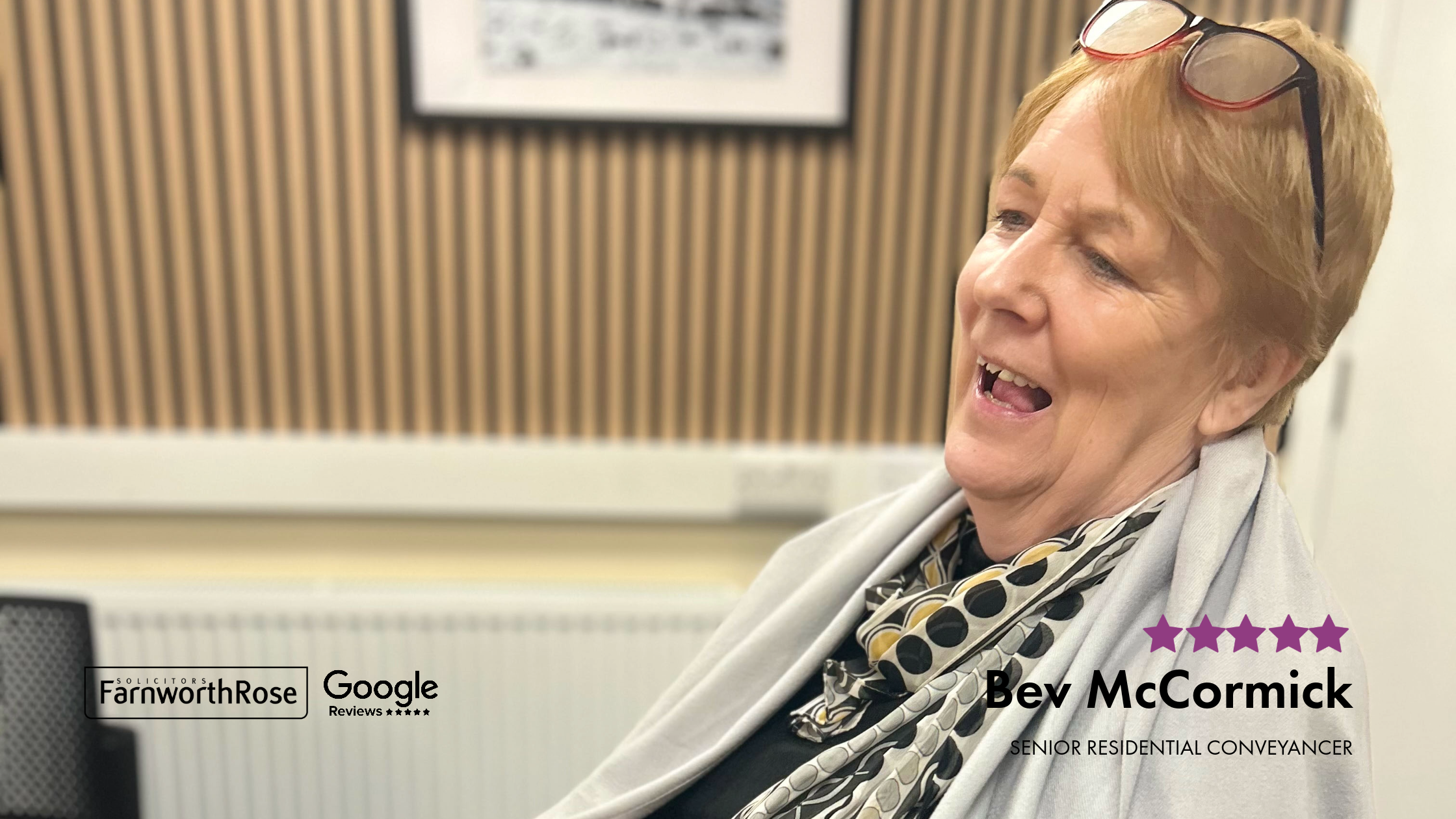
Company Assets in Divorce
✓ Specialist in Company Assets in Divorce
✓ Over 35 years of experience guiding directors through complex financial settlements
✓ Award-winning legal team, trusted for our expertise in commercial and family law crossover issues
Dividing Business Assets in Divorce
When a marriage ends, business interests can add an extra layer of complexity — both emotionally and financially. At Farnworth Rose, we understand that your company often represents more than just income; it reflects your ambition, legacy and future security.
Whether you are a business owner, shareholder, director, or spouse, your company often reflects your hard work, ambition, and future security. Protecting your business interests and securing your financial stability are essential. With over 35 years of experience advising families, individuals and business owners, our award-winning team brings a rare combination of technical excellence, commercial understanding, and personal empathy to every case. We work alongside you to deliver tailored advice that gives you confidence, clarity, and reassurance at every step.
Whether your business is a family-run enterprise, a larger company, or shares in a wider partnership, our divorce solicitors in Lancashire are here to help guide you through the process with strategic insight and unwavering support.
Why Choose Farnworth Rose For Divorce Involving Companies?
At Farnworth Rose, we understand that every business and every divorce is unique. That is why we take the time to understand the full picture: your business’s financial value, its role in your life, your family’s future, and your personal goals.
Our team combines family law expertise with commercial awareness. Where necessary, we work closely with trusted external experts, including forensic accountants and tax advisors, to ensure your case is supported by the very best specialist advice. We are proud to offer a truly client-first approach, where your priorities define our advice. We act swiftly and proactively, identifying potential challenges early and guiding you through each decision with clarity and compassion.
We also believe in complete transparency. From the outset, you will receive a clear, detailed cost estimate with no hidden surprises. Throughout your case, you will have direct access to your dedicated solicitor, ensuring you always know who to turn to when you need support.
At Farnworth Rose, you can trust us to protect what matters most, your business, your finances, and your future.
How Businesses Are Treated in Divorce
In England and Wales, businesses are usually treated as matrimonial assets if they were created, developed or increased in value during the marriage. Even if only one spouse worked within the business, it may still be considered part of the overall financial settlement.
However, courts are keen to preserve the viability of businesses wherever possible. Selling a business is generally seen as a last resort. Instead, solutions are often crafted that allow the business to continue operating while achieving a fair division of value between the parties.
Depending on the circumstances, the value of the business may be balanced against other matrimonial assets, such as property or pensions. Alternatively, one spouse may buy out the other's interest, or the income generated by the business may be used to provide ongoing financial support through spousal maintenance.
When businesses are jointly owned by third parties, such as family members or external investors, particular care is needed to protect wider commercial interests. At Farnworth Rose, we have extensive experience in handling these more complex ownership structures and safeguarding your business relationships during the divorce process.
Common Scenarios Involving Company Assets in Divorce
We regularly support clients through a variety of business-related divorce situations. Some of the most common include:
+ Jointly Owned Family Businesses
In many cases, spouses have co-built a business and serve as joint directors, shareholders, or partners. A divorce often requires difficult decisions—should the business be sold, should one party buy out the other, or can a continued professional relationship work? Each route has significant legal, financial and emotional implications, and we’ll help you weigh your options clearly and confidently.
+ One Spouse as Business Owner
Where one spouse is the sole or majority owner, director, or shareholder, and the other has no direct involvement, questions often arise about how the business is valued within the marital assets. Even if the company is in one name, its worth can—and likely will—form part of the financial settlement. We work to ensure a fair outcome while protecting the viability of the business.
+ Involvement in Wider Family Businesses
Sometimes, the business is owned with parents, siblings, or other relatives. This can create additional layers of complexity, particularly where shares or ownership stakes need to be valued without disrupting the broader family dynamics. Our experience in family business disputes allows us to navigate this sensitively, always balancing fairness with practicality.
+ Partnerships and LLPs
Spouses who are part of a professional partnership or Limited Liability Partnership (LLP) may be subject to restrictions within their partnership agreement. These can limit the ability to transfer or liquidate their interest without consent from other partners. We provide targeted advice that respects both your legal entitlements and the operational needs of your business partners.
+ Sole Traders and Entrepreneurs
Where a spouse is self-employed or operates as a sole trader, their business assets are often indistinguishable from their personal assets. In these cases, we work carefully to assess the value of the business, its earning capacity, and its role in your family’s finances to ensure a just division that considers both parties’ futures. No matter your role or the size of your business—from family-run shops to rapidly scaling enterprises—our family law solicitors will take the time to truly understand how your business works and what it means to your financial stability. We offer tailored, strategic advice that reflects your real-world circumstances, whether you’re steering a thriving company, navigating challenges, or preparing for growth post-divorce.
Valuing a Business for Divorce Purposes
A fair and accurate valuation of the business is essential to reaching an equitable settlement. Typically, an independent forensic accountant, appointed by agreement between both parties, will carry out the valuation. Known as a Single Joint Expert, their role is to provide an impartial assessment that the court, and the parties, can rely on.
Valuation is rarely straightforward. It often involves a detailed review of the business’s financial accounts over the previous years, an analysis of cash flow and profitability, an assessment of tangible assets such as property or machinery, and a consideration of future earning capacity. The nature of the business structure — whether it is a sole trader, partnership, limited company or otherwise — will also be taken into account.
In some cases, particularly if a company is relatively small or the parties are largely in agreement, a simpler "desktop" valuation may be possible. In more nuanced situations, additional expert advice, including tax planning support, may be needed to ensure that the true value of the business is properly understood.
At Farnworth Rose, we work closely with leading experts to ensure that every relevant factor is considered, helping you achieve a fair, informed and commercially sound outcome.
Protecting Your Business During Divorce
If you are concerned about protecting your business through a divorce, it is important to seek early, strategic legal advice. There are several measures that can help reduce risk and preserve business value.
For those planning ahead, pre-nuptial and post-nuptial agreements can clearly define how business assets should be treated in the event of divorce. Shareholder agreements or partnership deeds can also include protections, such as restrictions on share transfers, that safeguard the business from disruption.
Where a divorce is already underway, careful structuring of settlements can minimise the risk of forced sales, protect liquidity, and ensure tax efficiency. We will work with you to explore every option, ensuring your business is protected as far as possible while securing a settlement that enables you to move forward with confidence.
At Farnworth Rose, we do not simply react — we proactively help you shape solutions that reflect your commercial reality and your personal future.
How We Can Help
Our divorce solicitors regularly assist clients with a wide range of business-related divorce issues, including:
Negotiating the fair division of jointly owned businesses
Protecting minority shareholder interests
Managing concerns around non-disclosure or undervaluation
Handling interventions from business partners or third parties
Structuring buy-outs and spousal maintenance in a tax-efficient manner
Advising on complex, cross-border or multi-jurisdictional business assets
Every client’s circumstances are unique, and our approach will always be individually tailored to your goals, needs and commercial circumstances.
Frequently Asked Questions About Companies in Divorce
+ Will I have to sell my business if I get divorced?
In most cases, no. Courts prefer to find ways of preserving businesses, such as through offsetting or structured buy-outs, rather than forcing a sale.
+ Can my spouse claim part of my business if they were never involved in it?
Yes, even if only one party ran the business, its value may still form part of the matrimonial assets to be divided.
+ How is a business valued in a divorce?
Typically through an independent valuation by a forensic accountant, considering assets, income, liabilities and future earning capacity.
+ Can business partners be affected by my divorce?
Potentially yes, especially if ownership structures are complex. Early legal advice is vital to protect both your interests and those of any partners or co-owners.
+ What if my spouse is refusing to disclose financial information about the business?
Courts can compel disclosure and may impose penalties for dishonesty. Our team has extensive experience in addressing non-disclosure issues swiftly and decisively.
+ What is the procedure if one spouse wants to keep the business and buy out the other’s share?
If one spouse wishes to keep the business, they will need to agree to a fair price to buy out the other’s share. If an agreement cannot be reached, the court may order an independent valuation. Financing may be required to complete the buy-out, and the transfer must be properly documented. Prenuptial or postnuptial agreements may also influence the outcome.
+ What are the tax implications of dividing business assets during a divorce?
Dividing business assets can trigger tax liabilities, including Capital Gains Tax on asset transfers and Stamp Duty Land Tax on property transactions. Early advice is essential to identify and manage any tax risks as part of your settlement.
+ Is a limited company protected in a divorce?
While a company has a separate legal identity, the court can treat a spouse’s shareholding as a matrimonial asset. The company itself is not directly affected unless formally joined into proceedings. Protective structures such as shareholder agreements may help minimise risk.
+ Do I need to disclose my director’s loan account (DLA) in a divorce?
Yes. A director’s loan account is treated as a financial asset or liability and must be disclosed. Whether the company owes you money, or you owe the company, the balance will be considered as part of the financial settlement.
+ Why are company assets so important in divorce?
For many families, a business (whether it’s a limited company, a small family firm, or a professional practice) can be one of the most valuable assets – both financially and as a source of ongoing income. Ensuring this asset is handled properly is critical for your financial future. Missteps could risk the business itself or lead to an unfair settlement. That’s why it’s vital to approach these cases with careful legal and financial guidance.
Contact Our Clean Break Divorce Solicitors
The breakdown of a business partnership or the commercial implications of a personal divorce can be as complex as they are emotionally and financially demanding. Whether you’re a company director seeking to safeguard your business interests, a shareholder navigating exit terms, or a business owner facing asset division, Farnworth Rose is here to support you with clarity, sensitivity and strategic expertise.
Our experienced Commercial Solicitors in Lancashire, based in Nelson near Burnley, specialise in helping companies and business owners manage the legal fallout of divorce or business separation. We will work closely with you to understand your goals, protect what matters most, and achieve resolutions that secure your financial future.
With over 35 years of experience, our team brings a deep understanding of commercial law, family law, and the intersection between the two. As a full-service firm, of solicitors in Burnley we offer seamless, joined-up legal advice that covers business valuations, property ownership, partnership disputes, shareholder rights, and commercial restructuring.
Recognised across the North West for our award-winning legal service, we have become the trusted choice for businesses seeking pragmatic and effective advice in high-stakes situations. We routinely advise commercial clients across Preston, Manchester, Blackburn, Rochdale and Bolton, and regularly act for companies further afield in Leeds, Sheffield, Huddersfield, Skipton and beyond.
Wherever your business is based in England or Wales, our specialist solicitors are here to provide bespoke, cost-effective legal solutions—helping you move forward with confidence and clarity.
To speak with one of our specialist Family Law Solicitors at Farnworth Rose, call us now on 01282 695 400 or complete the form below, and we’ll be in touch.



